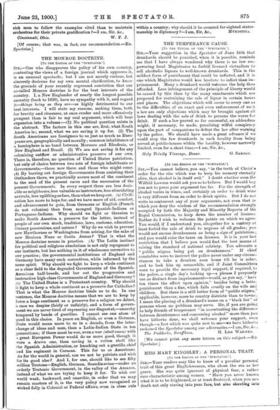[TO THE EDITOR OF THE "SPECTATOR."]
SIR,—You cannot believe, you say, in the teeth of Christ's order for the rite which was to keep his memory eternally alive, that alcohol is in itself evil." I doubt whether even Sir Wilfrid Lawson would ask you so to believe. But I would beg you not to press your argument too far. For the strength of alcohol varies in wines, and certainly an order to drink wine is very different from an order to drink spirits. But I do not write to controvert any of your arguments, not even that it which you deny the wisdom of the recommendation strongly accepted by both the Majority and Minority Reports of the Royal Commission, to keep down the number of licenses. Rather do I wish to welcome the points on which we agree. You would, if I understand you, altogether for a century at least forbid the sale of drink to negroes of all grades; you would not excuse drunkenness as being a sign of patriotism ; and you would raise the taxes on licenses. It is in your last restriction that I believe you would find the best means of raising the standard of national sobriety. You advocate a " public stigma being put on drunkenness." If chief constables were to instruct the police never under any circum- stances to take a drunken man home till he is sober, and to lock him up meanwhile, and if Joint Committees were to provide the necessary legal support, if required, to the police, a single day's locking up—a phrase I purposely use as distinct from imprisonment—would, as you say, - have ten times the effect upon opinion," besides being a bette. punishment than a fine, which falls cruelly on the wife and children. But there is a still better form of "public stigma,' applicable, however, more to country districts than to towns ; I mean the placing of a drunkard's name on a " black list " of persons whom no publican may serve. Sir, if you are going to help friends of temperance " in accentuating the difference between drunkenness and consuming alcohol" more than you have hitherto done, we shall welcome your support, even though—a fact which was quite new to me—we have hitherto reckoned the Spectator among our adversaries.—I am, Sir, &c., [We cannot print any more letters on thin subject. —ED Spectator.]


































 Previous page
Previous page